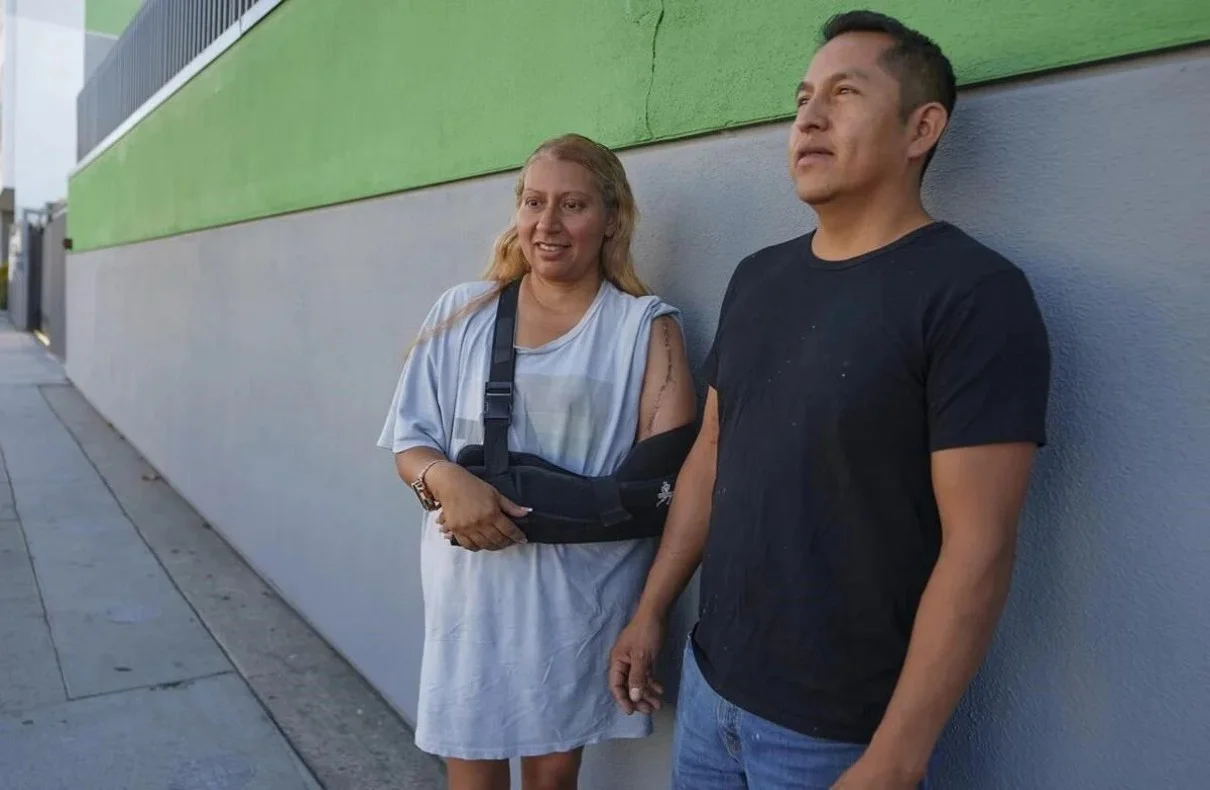After President Joe Biden unveiled a new program that would open a path for immigrant spouses to become U.S. citizens, Oscar Silva immediately applied, and on Monday he couldn’t hide his joy when he received an email confirming his appointment for mandatory biometric screening.
But a few hours later, Silva’s joy vanished: A federal judge in Texas temporarily suspended the measure that could have benefited nearly 500,000 immigrants already in the United States, halting one of the most important presidential actions to provide access to naturalization in many years.
“I don’t know what’s going to happen,” Silva said Tuesday. The 23-year-old college student came to the U.S. as a child and lives in Texas with his wife, Natalie, a U.S. citizen and high school teacher who is the family breadwinner.
Even though the federal government’s “Keeping Families Together” program only began accepting applications last week, families and immigration lawyers say there’s already confusion, uncertainty and frustration following U.S. District Judge J. Campbell Barker’s order. Couples who have already applied are in limbo and those who haven’t are considering waiting out the legal process in the Republican challenge.
Applicants will have to pay a $580 processing fee. After Barker’s order, the Florida Immigrant Coalition said it called on people to “consider their options and make the best decision for their families at this time.”
The suspension came in response to a challenge by 16 states led by Republican attorneys general who filed suit just days after the program began accepting applications on Aug. 19. The order, known as an administrative suspension, will be in effect for 14 days but could be extended.
“This decision is incorrect. “It is not necessary for these families to be split up,” Biden stated in a statement on Monday. Declaring that the initiative would do irreversible damage, the states have accused the federal government of eschewing Congress for “obvious political purposes.”
The judge’s ruling was applauded by Texas Attorney General Ken Paxton, whose office is among those spearheading the litigation. “This is just the beginning. In a statement, he declared, “We will not stop fighting for Texas, our nation, and the rule of law. The government will continue to accept applications and defend the program in court, according to a statement released by the Department of Homeland Security (DHS) on Tuesday.
Silva and his wife, Natalie, are once again haunted by the fear of being separated. The traditional process of applying for a green card can require a spouse living in the country illegally to return to their home country — often for years — always with the risk of not being allowed back into the United States.
“We thought this was our chance to finally go through this process together without the fear of the possibility of spending 10 years apart,” Silva said. Now, “I’m heartbroken, very sad … because without this we face great uncertainty.”
Immigration attorney Laura Flores-Perilla said “nothing is really clear” about what will happen with Silva’s appointment, scheduled for next month. “I can’t underestimate the impact of this temporary pause,” said Flores-Perilla, an attorney with the Action Justice Center.
Gregory Chen, director of government relations for the American Immigration Lawyers Association, said he has heard from attorneys with the association that at least hundreds of people have applied since the program began, some of whom applied and were approved the next day.
Attorneys are also trying to understand what the order means for their clients. According to Chen, the organization’s list for attorneys interested in the program “crashed” after the judge issued his ruling late Monday night.
Advocates worry that changes resulting from this lawsuit, even temporary ones, will create “chaos and uncertainty” for applicants. Chen said he has seen the impact of lawsuits on other immigration programs.
In Los Angeles, Roberto Garcia, 37, and his wife, Maria, paid a lawyer $3,000 to fill out a lengthy form but had yet to file an application because of Monday’s order. Now they’re wondering if they should take the risk and pay processing fees for a program that’s on hold.
“I didn’t think this was going to happen, it’s so hard,” Roberto Garcia said, referring to the order suspending the program. “We’re not a priority, it’s bad that they play with people’s emotions.”
Roberto is the sole breadwinner for his family of five and makes a living from his construction business in California. He also sends money to his family in Mexico.
If approved, applicants have three years to apply for permanent residency. During that period, they can obtain work permits.
But Maria Garcia said she is losing hope and is considering moving to Mexico, where her husband’s parents and siblings live.
“We’ll never be able to buy a house here,” she said. “Here, if you do something wrong, you get rewarded; if you do something right, you get punished.”
